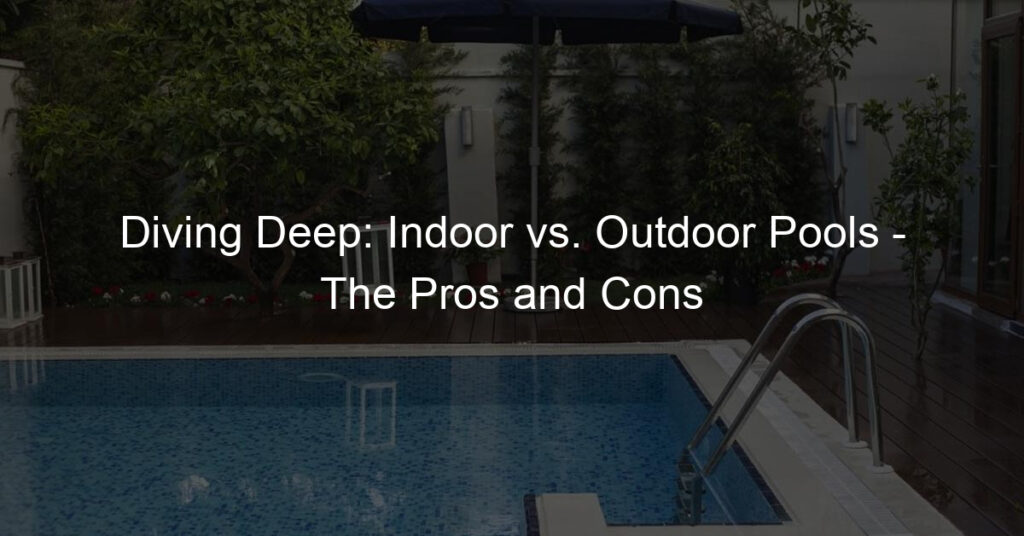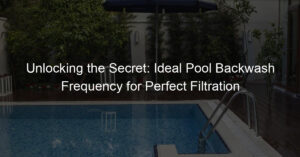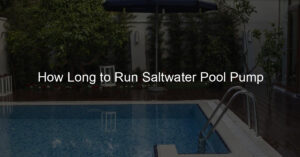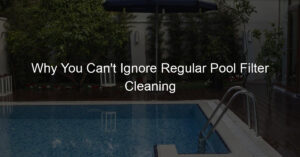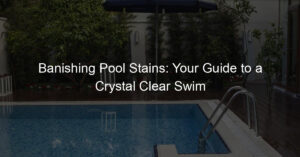Introduction to Indoor and Outdoor Pools
Welcome to our comprehensive guide on indoor and outdoor pools. Whether you’re a homeowner considering adding a pool to your property or simply curious about the differences between indoor and outdoor pools, this guide is for you. We’ll cover the basics, the pros and cons, and everything in between.
- Understanding the basics of indoor and outdoor pools
- Why choose a pool for your home?
Indoor pools are located within a building or structure, providing a controlled environment that can be enjoyed year-round. They are typically heated and can be used for a variety of activities, from swimming laps to water aerobics.
Outdoor pools, on the other hand, are exposed to the elements. They are a popular choice for those who enjoy swimming in the sunshine and prefer a more natural setting. Outdoor pools can be seasonal or year-round, depending on the climate.
Having a pool at home offers numerous benefits. It provides a place for exercise, relaxation, and entertainment. It can also increase the value of your property. According to a study by the National Association of Realtors, a pool can increase a home’s value by as much as 7%.
Moreover, a pool can be a great way to bring family and friends together. Whether it’s a casual swim on a hot summer day or a planned pool party, a pool can provide hours of fun and enjoyment.
As we delve deeper into this guide, we’ll explore the benefits and drawbacks of both indoor and outdoor pools, compare their costs, discuss maintenance requirements, and provide design ideas. By the end of this guide, you’ll have a better understanding of which type of pool is the best fit for your home and lifestyle.
Indoor Pools Benefits
Indoor swimming pools offer a plethora of benefits that can greatly enhance your swimming experience. Let’s delve into some of the key advantages:
- Year-round swimming regardless of weather: With an indoor pool, you never have to worry about the weather conditions. Whether it’s raining, snowing, or simply too hot, your swimming schedule remains unaffected. This is particularly beneficial for those who use swimming as a regular form of exercise. According to a study by the Centers for Disease Control and Prevention, swimming can help maintain a healthy weight, heart, and lungs. With an indoor pool, you can reap these health benefits all year round.
- Increased privacy: Indoor pools offer a higher level of privacy compared to their outdoor counterparts. You can swim at any time without worrying about prying eyes. This is especially advantageous for those who prefer solitude during their swim or for families who value their privacy.
- Controlled environment: Indoor pools provide a controlled environment, allowing you to adjust the water and air temperature to your liking. This not only enhances your swimming experience but can also be beneficial for those with certain health conditions. For instance, people with arthritis can benefit from warm water exercises, as the Arthritis Foundation suggests it helps reduce pain and improve joint function.
In conclusion, indoor pools offer a convenient and private swimming experience, with the added benefit of a controlled environment. Whether you’re a fitness enthusiast, a privacy-conscious individual, or someone with specific health needs, an indoor pool can be a great addition to your home.
Outdoor Pools Drawbacks
While outdoor pools offer a refreshing and fun way to enjoy the sun and fresh air, they also come with a few drawbacks. Let’s take a closer look at some of these challenges.
- Weather dependency: Unlike indoor pools, outdoor pools are heavily dependent on the weather. They are most enjoyable during warm, sunny days. However, during colder months or rainy days, they can be less appealing. This means that you may not be able to use your pool year-round, depending on your location.
- Increased maintenance: Outdoor pools require more maintenance than indoor ones. This is because they are exposed to the elements. Leaves, dirt, and other debris can easily get into the pool, requiring regular cleaning. Additionally, outdoor pools are more prone to algae growth, which can require additional chemical treatments to keep the water clean and safe.
- Lack of privacy: Outdoor pools are usually less private than indoor pools. Unless you have a high fence or live in a secluded area, neighbors and passersby may be able to see into your pool area. This can be a drawback for those who prefer more privacy when swimming or lounging by the pool.
For instance, if you live in a region with a long winter, your outdoor pool may be out of commission for several months each year. This can limit the value you get from your investment.
According to the National Swimming Pool Foundation, pool owners can spend up to 4 hours per week on pool maintenance. This includes tasks like checking water chemistry, cleaning the pool, and servicing the pool equipment.
Despite these challenges, many people still choose outdoor pools for their homes. The key is to understand these drawbacks and plan accordingly. For example, you might decide to invest in a pool cover to reduce maintenance, or install a privacy fence to create a more secluded pool area.
Comparing Indoor and Outdoor Pools
Advantages of Indoor Swimming Pools
Indoor swimming pools offer a range of benefits that can enhance your lifestyle in numerous ways. Let’s delve into some of the key advantages:
- Health benefits
- Convenience and accessibility
- Increased property value
Swimming is a fantastic form of exercise that works out your entire body. With an indoor pool, you can swim all year round, regardless of the weather. This consistent exercise can help maintain a healthy weight, improve cardiovascular health, and boost your mood. Indoor pools also offer a controlled environment, reducing the risk of sunburn and heatstroke during hot summer days.
Indoor pools provide the convenience of swimming at any time, day or night, without worrying about the weather conditions. This accessibility means you can stick to your exercise routine or enjoy a relaxing swim whenever you wish. Plus, you don’t have to deal with the crowds at public pools.
Adding an indoor pool to your home can significantly increase its value. It’s an attractive feature that many potential buyers look for, especially in high-end real estate markets. An indoor pool can transform your home into a luxurious retreat, making it a worthwhile investment.
Indoor pools offer a unique blend of health, convenience, and financial benefits. They provide a private, year-round space for exercise and relaxation, while also potentially boosting your property’s value. Whether you’re a fitness enthusiast, a busy professional seeking a convenient way to unwind, or a homeowner looking to enhance your property, an indoor pool could be a perfect addition to your home.
Disadvantages of Outdoor Swimming Pools
While outdoor swimming pools can offer a refreshing escape during hot summer days, they also come with a few drawbacks. Let’s delve into some of the disadvantages that you might want to consider before investing in an outdoor pool.
- Seasonal Use
- Higher Maintenance Costs
- Weather Damage
One of the main disadvantages of outdoor swimming pools is their seasonal use. Unlike indoor pools, outdoor pools are largely dependent on the weather. During the colder months, the pool may not be usable, limiting your swimming to only the warmer months of the year. This can be a significant drawback for those who wish to swim year-round.
Outdoor pools typically require more maintenance than indoor pools. This is because they are exposed to the elements, which can lead to a buildup of leaves, dirt, and other debris in the pool. Additionally, outdoor pools often require more chemicals to keep the water clean and safe for swimming, which can add to the overall maintenance cost.
Another disadvantage of outdoor swimming pools is the potential for weather damage. Harsh weather conditions such as heavy rain, wind, or snow can cause damage to the pool and its surrounding area. This can lead to costly repairs and may even shorten the lifespan of your pool.
In conclusion, while outdoor swimming pools can provide a great way to enjoy the outdoors and stay cool during the summer, they also come with certain drawbacks. It’s important to weigh these disadvantages against the benefits before making a decision.
Indoor vs Outdoor Pools Cost
When considering the addition of a pool to your home, it’s important to weigh the costs involved. This includes not only the initial installation costs, but also the ongoing maintenance costs and the long-term value the pool will add to your property. Let’s take a closer look at these aspects for both indoor and outdoor pools.
- Initial Installation Costs
- Maintenance Costs
- Long-term Value
The initial installation cost for an outdoor pool can range from $25,000 to $50,000, depending on the size and type of pool. This includes excavation, pool construction, and landscaping. Indoor pools, on the other hand, can be significantly more expensive due to the need for additional construction such as insulation and ventilation systems. The cost for an indoor pool can start from $100,000 and can go up to $200,000 or more.
Maintenance costs for outdoor pools can be quite high due to the need for regular cleaning, chemical balancing, and potential repairs. These costs can range from $1,200 to $1,800 per year. Indoor pools, while also requiring regular maintenance, can often be less expensive in the long run as they are not exposed to the elements and therefore require fewer repairs. The maintenance cost for an indoor pool can range from $600 to $1,200 per year.
Both indoor and outdoor pools can add significant value to your home. Outdoor pools can increase your home’s value by 5% to 7%, while indoor pools can increase it by 8% to 10%. However, it’s important to note that the value added by a pool can also depend on your location. In warmer climates where pools can be used year-round, they are likely to add more value than in colder climates where their use is seasonal.
In conclusion, while indoor pools may have a higher initial cost, their maintenance costs can be lower and they can add more value to your home in the long run. However, the decision should ultimately be based on your personal preferences, budget, and the climate in which you live.
Maintenance of Indoor and Outdoor Pools
Having a swimming pool at home is a luxury that comes with its own set of responsibilities. One of the most important aspects of owning a pool is its maintenance. Let’s delve into the specifics of maintaining an indoor pool.
Indoor Pool Maintenance
Indoor pools provide a controlled environment for swimming, regardless of the weather outside. However, they require regular care to ensure they remain clean, safe, and enjoyable. Here are three key aspects of indoor pool maintenance:
- Regular Cleaning
- Climate Control
- Equipment Checks
Just like any other part of your home, your indoor pool needs regular cleaning. This includes skimming the surface for debris, vacuuming the pool floor, and scrubbing the pool walls to prevent algae growth. It’s recommended to do this at least once a week.
Indoor pools are subject to the climate conditions of the enclosed space they are in. Therefore, it’s crucial to maintain a balanced temperature and humidity level. This not only ensures a comfortable swimming environment but also prevents the growth of mold and mildew. A good pool dehumidifier can help maintain the right climate conditions.
Regular checks on your pool equipment, such as the pump, filter, and heater, are essential to keep your pool running smoothly. These checks can help identify any potential issues early, preventing costly repairs in the future. It’s recommended to have a professional inspect your pool equipment at least once a year.
In conclusion, indoor pool maintenance involves regular cleaning, climate control, and equipment checks. By following these steps, you can ensure a clean, safe, and enjoyable swimming experience all year round.
Outdoor Pool Maintenance
Maintaining an outdoor pool can be a bit more challenging compared to an indoor one due to the exposure to various weather conditions. However, with the right knowledge and consistent care, you can keep your pool in top shape all year round. Here are some key aspects to focus on:
- Seasonal Cleaning
- Weatherproofing
- Regular Equipment Checks
Seasonal cleaning is vital to keep your outdoor pool healthy and safe. As seasons change, your pool can accumulate leaves, dirt, and other debris, which can affect the water quality and potentially damage the pool equipment. In the spring, it’s a good idea to deep clean your pool and prepare it for the summer. In the fall, consider covering your pool to protect it from falling leaves.
Outdoor pools are exposed to various weather conditions, including sun, rain, wind, and in some cases, snow. Weatherproofing your pool can help protect it from these elements. This can include using a pool cover to protect it from debris, applying a UV protectant to the pool’s surface to prevent sun damage, and ensuring the pool’s heating system is well-maintained to withstand colder temperatures.
Regular equipment checks are crucial to ensure your pool runs smoothly. This includes checking the pool pump, filter, heater, and other equipment for any signs of wear and tear. Regular maintenance can help prevent costly repairs in the future. It’s recommended to have a professional check your pool equipment at least once a year.
In conclusion, outdoor pool maintenance requires a bit more effort due to the exposure to various weather conditions. However, with regular cleaning, proper weatherproofing, and regular equipment checks, you can enjoy your outdoor pool for many years to come.
| Outdoor Pool Maintenance | Description |
|---|---|
| Seasonal Cleaning | Deep cleaning of the pool with the change of seasons to remove debris and prepare it for use. |
| Weatherproofing | Protecting the pool from various weather conditions using pool covers, UV protectants, and maintaining the heating system. |
| Regular Equipment Checks | Checking the pool pump, filter, heater, and other equipment regularly for signs of wear and tear. |
Indoor Swimming Pool Design
Designing an indoor swimming pool requires careful planning. There are several elements to consider, including the space available, the style and aesthetics of the pool, and functional design elements. Let’s take a closer look at each of these aspects.
- Space Considerations
When designing an indoor pool, the first thing to consider is the space available. The size of your pool will depend on the size of the room. Remember, you need to leave enough space around the pool for walking and lounging. According to a survey, the average size of an indoor pool is 8m x 4m. However, the size can be adjusted according to your needs and the space available.
- Style and Aesthetics
The style and aesthetics of your indoor pool should match the overall design of your home. You can choose from a variety of styles, from modern and minimalist to rustic and traditional. The color of the pool tiles, the type of lighting, and the choice of poolside furniture can all contribute to the overall aesthetic. Remember, a well-designed pool can add value to your home.
- Functional Design Elements
Functional design elements are crucial in an indoor pool. These include the pool’s depth, the type of stairs or ladder, the placement of handrails, and the type of pool cover. You should also consider the type of filtration system and heating system. A case study showed that a pool with a good filtration system and heating system can save up to 30% on energy costs.
In conclusion, designing an indoor swimming pool involves careful consideration of space, style, and functionality. With the right planning, you can create a pool that is not only beautiful but also functional and energy-efficient.
Outdoor Swimming Pool Ideas
Creating an outdoor swimming pool is an exciting project. It not only adds value to your home but also provides a perfect spot for relaxation and entertainment. Here are some ideas to consider when planning your outdoor swimming pool.
- Landscape Integration
- Poolside Amenities
- Design Trends
One of the most important aspects of an outdoor swimming pool is how it fits into the overall landscape of your property. A well-integrated pool can transform your backyard into a serene oasis. Consider the natural elements around your home. If you have a lot of trees, you might want to create a pool that blends in with the greenery. If you live in a desert area, a pool with a natural rock design might be more fitting. Remember, the goal is to make the pool look like a natural part of your landscape.
Poolside amenities can greatly enhance your swimming pool experience. These include lounging areas, outdoor showers, poolside bars, and even outdoor kitchens. Think about what you and your family would enjoy. Do you love to host pool parties? A poolside bar might be a great addition. Do you enjoy relaxing by the pool? Consider adding comfortable lounging chairs. The possibilities are endless.
Keeping up with the latest design trends can help make your outdoor swimming pool stand out. Some popular trends include infinity pools, glass tile pools, and pools with built-in spas. You might also want to consider adding unique features like waterfalls, fire pits, or custom lighting. Remember, the design should reflect your personal style and meet your needs.
Creating an outdoor swimming pool is a big project, but with careful planning and consideration, you can create a beautiful and functional space that you and your family will enjoy for years to come.
Indoor Pool vs Outdoor Pool for Home
Choosing between an indoor and an outdoor pool for your home can be a tough decision. Both have their own unique advantages and considerations. In this section, we will explore the factors you should consider when choosing the right pool, look at some real-life examples of indoor and outdoor pool installations, and provide key takeaways for homeowners.
- Considerations for choosing the right pool
- Case studies of indoor and outdoor pool installations
- Key takeaways for homeowners
- Consider your budget: Indoor pools generally cost more to install and maintain than outdoor pools.
- Think about your lifestyle: If you plan to use the pool year-round, an indoor pool may be a better choice. If you prefer swimming in natural light and open air, an outdoor pool might be more suitable.
- Consider the climate: If you live in a region with a warm climate, an outdoor pool can be a great option. For colder climates, an indoor pool allows for year-round use.
When deciding between an indoor and outdoor pool, you need to consider several factors. These include your budget, the available space in your home, the climate of your location, and your personal preferences. Indoor pools offer year-round swimming and privacy, but they can be more expensive and require more maintenance. Outdoor pools, on the other hand, can provide a more natural and relaxing environment, but they are subject to weather conditions and seasonal use.
Let’s look at some real-life examples. In a suburban home in Florida, a family opted for an outdoor pool due to the state’s warm climate and their spacious backyard. The pool has become a central feature of their home, providing a place for relaxation and social gatherings. On the other hand, a couple in New York decided to install an indoor pool in their basement. Despite the higher cost, they found it to be a worthwhile investment as it allows them to swim and exercise throughout the year, regardless of the weather.
Here are some key points to remember when choosing between an indoor and outdoor pool:
In conclusion, the choice between an indoor and outdoor pool depends on various factors. By considering these aspects carefully, you can make the best decision for your home and lifestyle.
Conclusion: Making the Right Choice
Choosing between an indoor and outdoor pool is a significant decision. It’s important to consider all the factors we’ve discussed in this article before making your choice. Let’s review the key points.
- Review of indoor vs outdoor pools
Indoor pools offer the advantage of year-round swimming, regardless of the weather. They also provide more privacy and can be controlled for temperature and humidity. However, they can be more expensive to install and maintain, and they require proper ventilation to prevent humidity issues.
On the other hand, outdoor pools allow you to enjoy the natural surroundings and sunshine. They are generally less expensive to install and maintain. However, their use is limited by weather conditions, and they require more regular cleaning due to exposure to the elements.
- Final thoughts and recommendations
When deciding between an indoor and outdoor pool, consider your budget, climate, privacy preferences, and how often you plan to use the pool. If you live in a region with harsh winters or value privacy and year-round use, an indoor pool might be the best choice. If you live in a warmer climate and enjoy swimming in the sunshine, an outdoor pool could be the right fit.
Remember, a pool is a significant investment. Take your time to weigh the pros and cons, and consider consulting with a pool professional to make the most informed decision.
In conclusion, whether you choose an indoor or outdoor pool, the most important thing is that it meets your needs and enhances your lifestyle. Happy swimming!

